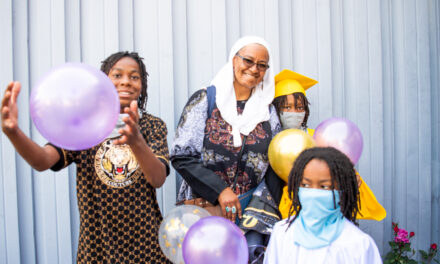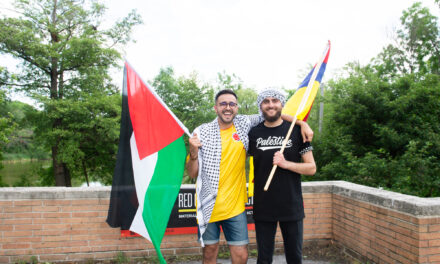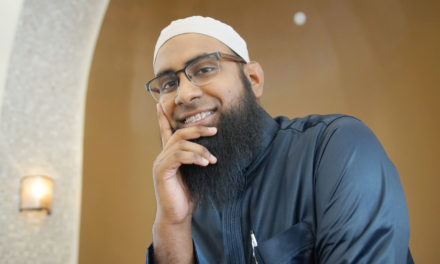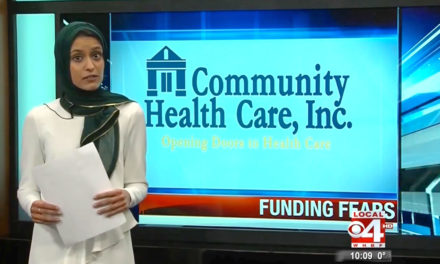A book published earlier this year by Marquette University Press reveals the central role Milwaukee played in the development of interfaith dialogue, both in the United States and globally. The book uncovers the influence of the Muslim-Christian dialogue begun 40 years ago by two Catholic nuns and a Muslim UWM professor that received the support of the Vatican and created a legacy that continues today.
The book, Interfaith Engagement in Milwaukee: A Brief History of Christian-Muslim Dialogue, is the result of a research project begun in spring 2017 by Marquette professor Irfan A. Omar and his students in a seminar called “Christians and Muslims in Dialogue.”
Omar, a professor of theology specializing in inter-connections between Islam and other religions, said he was aware of the strength of local interfaith dialogues and asked his students in the seminar “if they wanted to do research on Milwaukee. But we didn’t know the depth of the engagement in 1980.” The book, edited by Dr. Omar and Kaitlyn C. Daley, one of the students in the seminar, is “a window into the history of interfaith activism in Milwaukee,” Professor Omar said in an interview.
Dr. Abbas Hamdani, who passed away last year; Sr. Jessine Reiss, OSF (Order of St. Francis); and Sr. Lucille Walsh, OSF, who passed away in 2013 at the age of 101; were the three original founders of the Islamic Christian Dialogue.
The three had known each other since the 1970s and were “interested in learning about world religions,” although, Omar said, “interfaith stuff was not fashionable at the time. After the Second World War, Jewish-Christian relations were just beginning to come online.” Jewish-Christian dialogues had been established in Milwaukee since 1975, Omar said. “One turning point for these people were things that came out of the Second Vatican Council in the late 60s.”
The research project focused on collecting documentation on events, meetings, and workshops, retrieving narratives through interviews, and the collection of artifacts like flyers and programs, including letters to and from the Vatican. “The students found a treasure trove,” Omar said.
Sr. Lucille Walsh’s 1985 letter to His Holiness John Paul II is included as Figure I in the book. At the time, Sr. Lucille was chairperson of the Interfaith Group, which, according to the letter, had the full support of Milwaukee’s archbishop at the time, Rembert Weakland. “They sought advice, encouragement, and ways to celebrate their work that was rooted in, as they rightly declared, the sacred scriptures they uphold and follow. The letter to the Pope did not go unnoticed,” as Dr. Omar wrote in his introduction to the interfaith book.

(Cover photo of the book)

(Three founders of the 1980 Christian Muslim Dialogue in the early 1990s)
After a follow-up letter and a detailed report from Sister Jessine Reiss came the second letter from the Vatican, this time from the President of the Secretariat for Non-Christians (now called the Pontifical Council for Interreligious Dialogue), Cardinal Francis Arinze, who thanked Sister Jessine for facilitating this “important activity for today’s world” and for keeping “us informed of the fine work of dialogue” taking place between Muslims and Christians in Milwaukee. “Our Secretariat gives its full support and encouragement to this important activity for today’s world,” wrote Cardinal Arinze in his letter to Sr. Jessine.
While the book reveals how deep and strong the roots of Milwaukee’s interfaith dialogue go, it does not stop there. Eventually the interfaith book project “was expanded” to become “a community-wide project to document . . . interfaith engagement and collaboration in the greater Milwaukee area,” Dr. Omar wrote in his introduction. The book includes an account of how formal dialogues between Jewish and Christian, especially Roman Catholic, groups in Milwaukee began a few years earlier than the Christian-Muslim dialogue.
Two of the chapters are written by members of a second generation of interfaith leaders, Janan Najeeb, president of the Milwaukee Muslim Women’s Coalition, and Judith Longdin, the former director of the Office of Ecumenical and Interfaith Concerns at the Archdiocese.
The original Muslim-Christian dialogues spread beyond faith leaders and engaged the community as a whole, said Dr. Omar, and included “a variety of Muslims and a variety of Christians, Catholics and Protestants, ministers and their spouses. Some religious scholars and some non-clergy. They met every month or every two months, seven or eight times a year. There was a committed core of 15 Christians and 15 Muslims.” But sometimes the programs included groups as large as 300-500, Omar said.
Curiosity and community welfare may have been the original impulses behind the dialogues, but the three founders “discovered as they got into it that all these religions actually mandate the practitioner to reach out, to learn about the other, to cross the road, as part of their practice of faith.” And, as Dr. Omar points out, “The rules of dialogue are fairly simple. Nobody is saying, you should believe this or believe that. When you come to the dialogue you are willing to listen to the other, and willingly agree to respect the other.”
By following these simple guidelines, and with the full support of the Vatican, a Muslim professor and two Catholic nuns established an interfaith dialogue, and, “anyone who was studying, teaching, or engaging in dialogue in the 1980s, knew about the Milwaukee dialogue,” Dr. Omar said.














